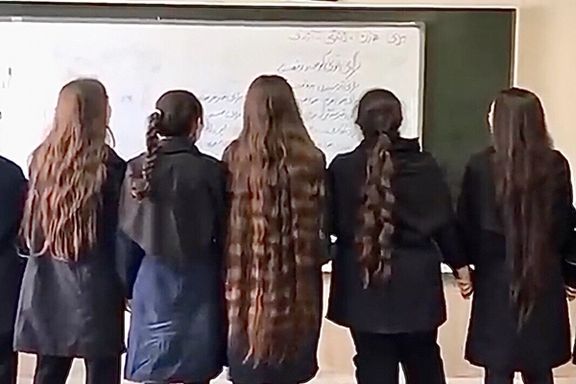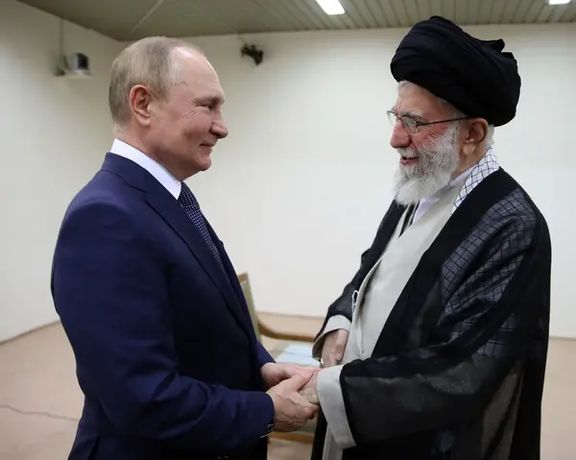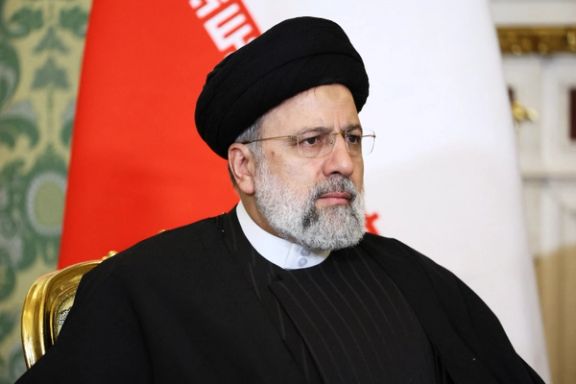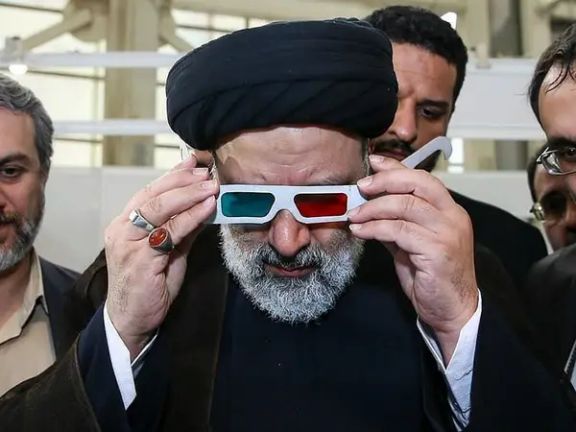Education Official Demands Hardline Hijab Enforcement At Schools

An Iranian education official has called for the enforcement of hijab among students to go far beyond school uniform rules.

An Iranian education official has called for the enforcement of hijab among students to go far beyond school uniform rules.
Mohammad Hossein Poursani, the Director-General of Cultural and Artistic Affairs at the Ministry of Education in Iran, raised concerns over "the areas of chastity, hijab, fashion, and clothing among students".
He said: "The subject of fashion and clothing in education aims to familiarize students with Islamic-Iranian clothing, and the outcome of this effort should be that students become acquainted with and practically use Islamic-Iranian clothing.
"The Ministry of Education, considering the diversity of activities, should pay special attention to the implementation of activities and programs in the field of chastity and hijab."
In recent months, hardliners in Iran have attempted to impose strict hijab rules in public spaces, including government offices, schools, universities, and hospitals.
However, many women continue to defy the imposed hijab regulations.
Social media images depict an increasing number of women appearing in public without head coverings, despite potential consequences from hijab enforcers. Some celebrities who participated in the Woman, Life, Freedom protests, where they removed their hijabs, continue to defy re-imposing it, even at the risk of being banned from work.

Russia and Iran will speed up work on a "major new interstate agreement", the Russian foreign ministry said on Tuesday.
It did not detail the scope of the agreement, which comes amid growing political, trade and military ties between Moscow and Tehran that the United States views with concern.
In a statement, Russia said the two countries' foreign ministers agreed in a phone call on Monday to speed up work on the agreement, which was at "a high stage of readiness".
Last week President Vladimir Putin held five hours of talks in the Kremlin with Iranian President Ebrahim Raisi.
Russia has procrastinated in renewing a two-decade-old strategic agreement with Iran, but with the war in Ukraine Moscow depends on Iranian weapons, such as kamikaze drones.
Like North Korea, whose leader Kim Jong Un met Putin in Russia's far east in September, Iran is an avowed enemy of the United States and can provide Moscow with military hardware for its war in Ukraine, where Russia has made extensive use of Iranian drones.
The Kremlin last month said Russia and Iran were developing their relations, "including in the field of military-technical cooperation” but declined to comment on a suggestion by the White House that Iran may be considering providing Russia with ballistic missiles.
Iran is the main backer of Israel's enemy Hamas. Israeli Prime Minister Benjamin Netanyahu spoke by phone with Putin on Sunday and voiced "robust disapproval" of Russia's "dangerous" cooperation with Iran.
Iranian authorities have said military cooperation with Russia is expanding day by day. Iran said last month it had finalized arrangements for Russia to provide it with Su-35 fighter jets, Mi-28 attack helicopters and Yak-130 pilot training aircraft.
Reporting by Reuters

Amirsalar Davoudi has been incarcerated since 2019 and has now been granted temporary release from Evin Prison on bail of 50 billion rial, equivalent to $100,000, a substantial sum in Iran.
His wife Tanaz Kolahchian revealed the news of his release on Monday.
Davoudi had created a channel on the social media platform Telegram through which he highlighted human rights abuses in the Islamic Republic.
Found guilty by a revolutionary court on charges of "propaganda against the state" and "insulting officials," Davoudi was sentenced to 30 years in jail and 111 lashes.
He was also alleged to have “collaborated with an enemy state" in giving an interview to Voice of America Persian-language television.
In April, Davoudi’s lawyer Vahid Farahani said that Davoudi was accused of "establishing a group to overthrow the system" in an interview with the New York-based Center for Human Rights in Iran.
Davoudi is among a number of distinguished defense lawyers jailed in Iran for carrying out their legal duties.
A 38-year sentence given to defense attorney Nasrin Sotoudeh in 2019 drew widespread international condemnation before her release two years into her term.
Without recourse to defense attorneys held for executing their professional responsibilities, defendants on politically motivated charges are compelled to select their legal representation from a list of state-approved lawyers.

Yemen's Iran-backed Houthis said on Tuesday they attacked the Norwegian commercial tanker STRINDA in their latest operation against commercial shipping in the Red Sea.
The group targeted the tanker with a rocket after the crew refused to respond to all warnings, Houthi military spokesperson Yehia Sareea said in a televised statement.
He vowed that the Houthis would continue blocking ships heading to Israeli ports until Israel allows the entry of food and medical aid into the Gaza Strip - more than 1,000 miles from the Houthi seat of power in Sanaa.
On Saturday, Sareea had threatened that Houthis would target all ships heading to Israel, regardless of their nationality. He also warned all international shipping companies against dealing with Israeli ports. "If Gaza does not receive the food and medicine it needs, all ships in the Red Sea bound for Israeli ports, regardless of their nationality, will become a target for our armed forces."
The attack on the tanker STRINDA took place about 60 nautical miles (111km) north of the Bab al-Mandab Strait connecting the Red Sea and the Gulf of Aden at about 2100 GMT, a US official told Reuters. A second US official said the STRINDA was able to move under its own power in the hours after the attack.
"There were no US ships in the vicinity at the time of the attack, but the (US Navy destroyer) USS MASON responded to the M/T STRINDA's mayday call and is currently rendering assistance," the US military's Central Command, which oversees American forces in the Middle East, said in a statement posted on social media platform X.
The attack caused a fire and damage but no casualties, the US military said in a statement.
The Houthi spokesman said that the group had managed to obstruct the passage of several ships in recent days, acting in support of the Palestinians.
The Iran-backed group controlling large parts of Yemen, began attacking Israel and international shipping in November, after other Iranian-backed militias in Iraq and Syria began targeting US bases in the two countries. Iran has clearly decided not to directly get involved in the Gaza war, but its proxies have been trying to exert military pressure on Israel and the United States. IRGC-affiliated media in Tehran reported the Houthi statement about targeting the tanker on Tuesday, without further comment.
The chemical tanker is now headed for a safe port, the ship's Norwegian owner, Mowinckel Chemical Tankers, told Reuters. The STRINDA tanker's crew of 22 from India are all unhurt, Mowinckel Chair Geir Belsnes said.
The chemical tanker is Norway flagged, and its Norwegian owner, Mowinckel Chemical Tankers, and manager Hansa Tankers could not be immediately reached for comment outside office hours.
The STRINDA had loaded vegetable oil and biofuels in Malaysia and was headed for Venice, Italy, data from ship tracking firm Kpler showed.
It was not immediately clear whether the STRINDA had any ties to Israel.
During the first week of December, three commercial vessels came under attack in international waters, prompting a US Navy destroyer to intervene.
The Houthis also seized last month a British-owned cargo ship that had links with an Israeli company.
The United States and Britain have condemned the attacks on shipping, blaming Iran for its role in supporting the Houthis. Tehran says its allies make their decisions independently.
Saudi Arabia has asked the United States to show restraint in responding to the attacks.
With reporting by Reuters

A legal complaint filed on Monday asked Swiss authorities to arrest Iran’s President Ebrahim Raisi if he travels to Geneva to attend a UN event.
The complaint has been lodged by three former political prisoners who seem to have narrowly escaped the Islamic Republic’s “prison massacres” of 1988.
Ebrahim Raisi was a member of the infamous Death Committee in Iran, which oversaw summary execution of between two to five thousand political prisoners in 1988.
The three survivors have accused Raisi of crimes against humanity, including genocide, torture, and extrajudicial executions. They have asked the Swiss federal public prosecutor to arrest and prosecute him.
Raisi was scheduled to participate in the United Nations Global Refugee Forum in Geneva, but UN officials told AFP on Monday evening that the Iranian delegation would be led by foreign minister Hossein Amir-Abdollahian.
It is unclear whether the change of plans –if confirmed– has been forced by the legal bid to arrest Raisi.
The legal complaint contends that Raisi played a pivotal role in the Death Committee. His role has been all but established by scores of testimonies, and by an audio recording of the meeting in which members of the Committee seek blessings of Hossein Ali Montazeri, the Supreme Leader’s deputy at the time.
In 2018, Amnesty International published a 180-page report on the “1988 prison massacres”, documenting summary execution of political prisoners in Tehran and 15 more cities across Iran. Ebrahim Raisi is one of the very few people to have been accused of crimes against humanity in that report.
In tandem with the legal action, an international campaign has been launched against Raisi’s involvement in the UN refugee forum. The signatories –including Nobel laureates, judges, academics, and UN rights experts– call for Raisi’s prosecution for past and ongoing crimes under international law.
"We firmly believe that the United Nations, as a bastion of human rights and justice, should not compromise its reputation by extending an invitation to an individual accused of grave human rights violations," reads the petition. "His presence at the UN forum contradicts the fundamental values the UN stands for."
The campaigners have asked the UN to "promptly rescind its invitation to Raisi," arguing that the institution’s reputation would be marred by extending an invitation to an individual accused of severe human rights violations.
“His regime beats, blinds and poisons Iranian women and girls,” wrote Hillel Neuer, an international human rights lawyer and the executive director of UN Watch. “Any democratic leader that meets with this terrorist will be rewarding evil.”
Responding to the petition, the UN refugee agency (UNHCR), defended Iran's participation, stating that the country is a UN member state with a significant number of refugees.
"The Iranian delegation will be led by the foreign minister," a spokesperson for UNHCR said in an email, according to AFP.
The UN Global Refugee Forum will be held in Geneva 13-15 December. It is held every four years with the aim of “easing pressures on host countries, enhancing refugee self-reliance, increasing access to third-country solutions and improving conditions in countries of origin.”
The 2023 forum is hosted by Switzerland and UNHCR, and co-convened by Colombia, France, Japan, Jordan and Uganda.

Iran’s president has said talk will not be enough to resolve the $3.5billion tea scandal in which ministers and officials are implicated.
Commenting on allegations that vast fortunes meant for tea imports have been embezzled, President Ebrahim Raisi claimed his government exposed the scandal nine months ago in publicly broadcast hearings. Iran's Judiciary has recently revealed that several senior officials of Raisi's administration have been implicated in the case.
He also cited Supreme Leader Ali Khamenei's assertion that "just talking about the thefts does not solve the corruption problem".
Accusations in the corruption case implicate numerous government offices spanning both current and past presidential administrations. This includes ministers of agriculture and industry, along with the governors of the Central Bank of Iran and the heads of the Iranian Customs Administration.
Raisi’s comments come as Supreme Leader Ali Khamenei, yet to comment on the case, consistently dismisses assertions of systematic corruption within Iran.
The scandal comes as the government struggles to curb inflation running above 50 percent, coupled with shortages of medicines and powdered baby formula.
Last week, Iran's Inspection Organization disclosed an investigation into a prominent tea importer for questionable financial practices. The company, responsible for a significant portion of the country's tea imports, allegedly received $3.37 billion in foreign currency at a discounted government rate for tea and machinery imports from 2019 to 2022. It is accused of selling $1.4 billion of the currency on the free market at a higher rate.
Alireza Salimi, a member of the parliament, commented on the corruption case saying: "The tea scandal has saddened many; all responsible parties should swiftly provide accurate and truthful information to prevent individuals deeply involved in corruption from taking advantage of the situation."
Observers suggest the developments point to systematic corruption, implicating several high-ranking government officials.